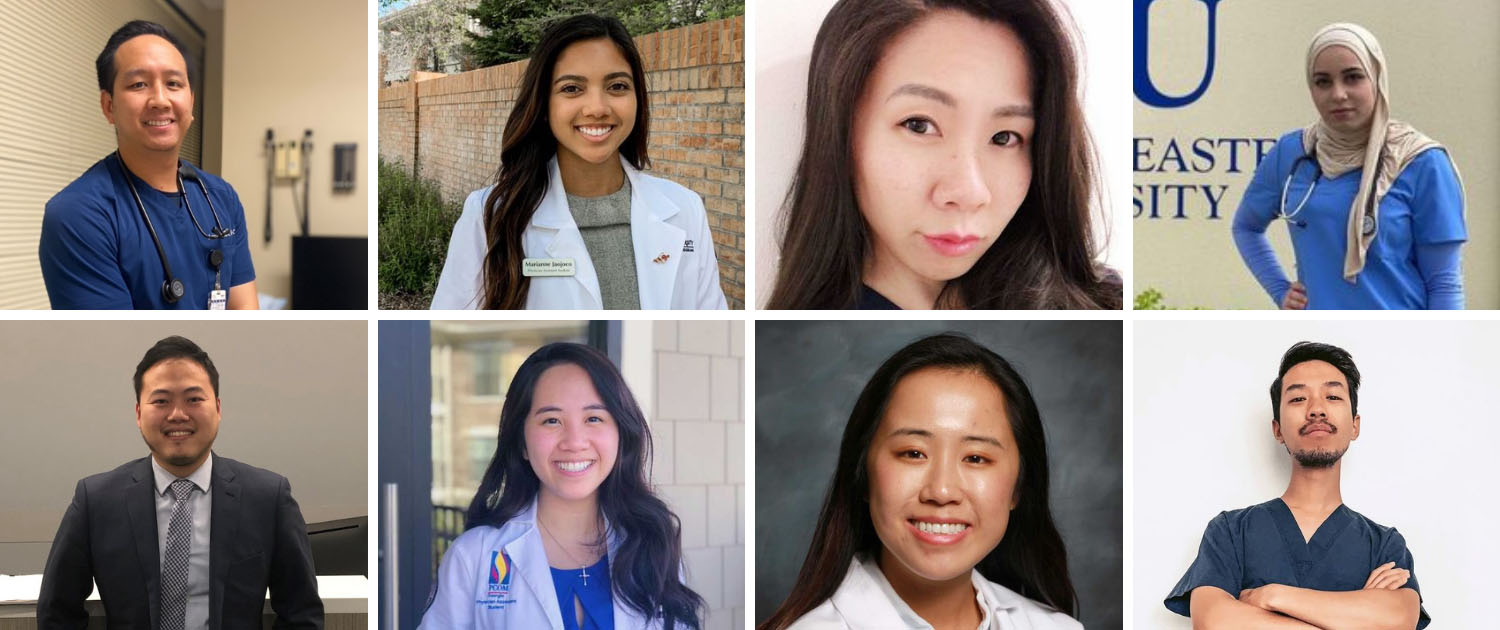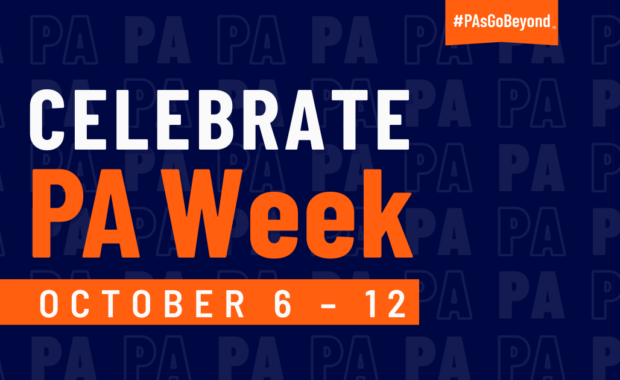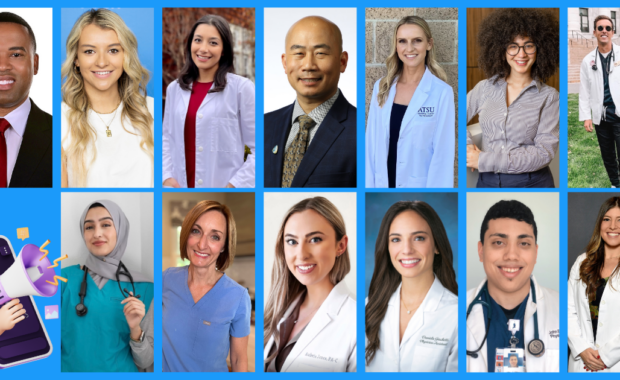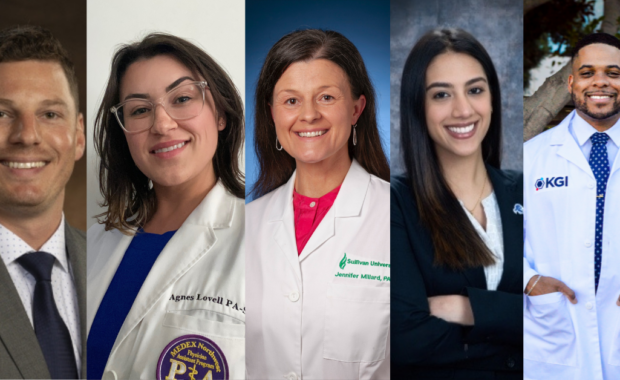Asian American and Pacific Islander PAs and PA Students Reflect on AAPI Heritage Month
AAPI PAs and PA Students Share Stories of Perseverance, Sacrifice, and More
May 3, 2021
May is Asian American and Pacific Islander (AAPI) Heritage Month, and AAPA is celebrating the history and achievements of the AAPI PA community. We asked eight AAPI PAs and PA students to share what they’re reflecting on during AAPI Heritage Month this year.

Aaron Hunro, PA-C – Occupational Medicine and Urgent Care, Southern California
During AAPI Heritage Month, I reflect on the Cambodian PAs who came before me, who paved the way for myself and my peers who are children of Cambodian refugees. I reflect on the PAs who came here as refugees and became PAs serving our communities as well as inspiring us to follow their footsteps. From meeting and working alongside the first few Cambodian PAs in Long Beach to knowing fellow Cambodian PA colleagues across the country— it’s a testament to our people’s resiliency and passion. It also marks the beginning waves of Cambodian PAs, who were raised by refugees and descendants of victims from The Killing Fields. To honor our ancestors and our community— we push through and continue to improve their quality of life and inspire others.
Marianne Jaojoco, PA-S2 – Rocky Vista University PA Program
I think that celebrating AAPI Heritage Month this year is especially important with the rise of anti-Asian hate over the past year. During AAPI Heritage Month this year, I will be reflecting on the history between the Philippines and the U.S. and how it has made an impact on where and who I am today. I am a proud Filipino American, and I would not be where I am today if it weren’t for the sacrifices and hard work of my family that came before me.
Tuyet-Trinh Katie Nguyen, PA-C – Urgent Care and Occupational Medicine, New Orleans
I’m a second-generation Vietnamese American raised in a village called Versailles, a small neighborhood in East New Orleans of Vietnamese immigrants. Like most Asian Americans, I grew up knowing I was different. I dealt with countless racist microaggressions that I uncomfortably laughed off “as a joke,” because I was trying so hard to assimilate. I’ve been spending a lot of time this month reflecting on how such small instances slowly became a force of habit for many of us in the AAPI community, further perpetuating the toxic stereotype of the docile, submissive model minority. The recent increase in attacks on AAPIs opened my eyes to how negatively it’s impacted us and placed targets on the backs of people we know and love. I am no longer keeping my head down. I am not going to be silent. I am speaking out against the hate and violence. I am encouraging others to do the same.
Maha Rafiq, PA-S1 – Nova Southeastern University PA Program
As a Pakistani American woman raised in the Islamic faith, I am quite familiar with the limitations, disparities, and discriminations Asian Americans face today. I choose to focus awareness on the methods we use to communicate healthcare today and the preventable diseases the AAPI population still battles in the U.S. in 2021. Hepatitis B, Tuberculosis, and HIV have become more prevalent within our population and there is a lot we can do about it. I grew up being exposed to several unfortunate stories about family and loved ones back home, due to the lack of care and compassionate medical treatment. Today, the same hometown is known to have one of the lowest rates of immunized children, so naturally, when I see similar instances occurring in the U.S., where we have resources to minimize them, it hits home for me. As a future clinician, I aspire to be well versed in disparities present among all populations and to provide adequate resources for patients to eradicate them.
Alex Tang, MBA, PA-C – PA Administrator, New York
Losing my parents in my 20s made me realize how much I relied on them to stay connected to my Chinese roots. The Chinese culture is centered upon family, which stems from the teachings of Confucianism. Growing up, besides being immersed in my culture such as speaking in Cantonese and consuming Chinese entertainment and food, family gatherings were often and common. This is less so nowadays due to COVID, and even less in my fragmented reality. All I can hope for is to share this tidbit, so others can appreciate and cherish what they have. As for me, this reflection serves as a powerful reminder that empowers me to do more in honor of my parents and for the greater good of society, which is why I became a PA.
Tram Dang, PA-S2 – PCOM Georgia PA Studies Program
With graduation rapidly approaching this July, my mind is swirling with so many thoughts. On one hand, I’m unbelievably excited to be finishing up this rewarding program that has taught me so much in such a short amount of time. This is all due to the great sacrifice my parents made to come to America, all to give opportunity to me and my siblings. At the same time, I’m burdened by the recent violence against Asian Americans, because they undoubtedly made the very same sacrifice for their children, yet we as first generation Asian Americans can’t protect our parents from these horrible crimes.
Ashley Kwan, PA-C – Breast Surgical Oncology, Long Beach
During this AAPI Heritage Month, I reflect on the recent hate crimes. I think of my Chinese paternal great-grandfather who traveled all the way from the poor small farm in the Taishan region of China’s Guangdong province to Sacramento to work on the Central Pacific Railroad in the 1860s. He and other Chinese Railroad Workers faced extreme racist violence. Nevertheless, he persisted and stayed even after the 1882 Chinese Exclusion Act. I am forever grateful for the opportunity he gave my father and for me to be an American citizen.
Patrick Nguyen, PA-S1 – Stony Brook PA Program
During this AAPI Heritage month, I find myself more appreciative of my Vietnamese culture. I also want to use this month to speak out against the anti-Asian hate sentiment. Being a first generation Asian-American, I am thankful for my parents and family members that have supported my dream of being a PA. I also want to express gratitude to my Little Saigon community in California, since it was all those patient experiences that inspired me to become a PA. I was once a child actor; thus, I am also thrilled to see more Asian artists in entertainment and winning awards.
Learn More
CDC: Improve the health of AAPI populations
Federal Asian Pacific American Council: AAPI Resource Center
You May Also Like
PA’s Immigrant Parents Inspire His Career in Critical Care
PAs: Get Involved in Genetics to Help Patients
Mental Health First Aid Instructor Advocates for PA Students
Thank you for reading AAPA’s News Central
You have 2 articles left this month. Create a free account to read more stories, or become a member for more access to exclusive benefits! Already have an account? Log in.



